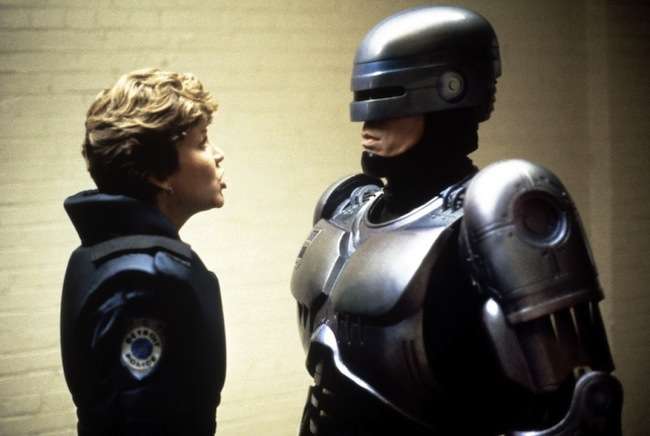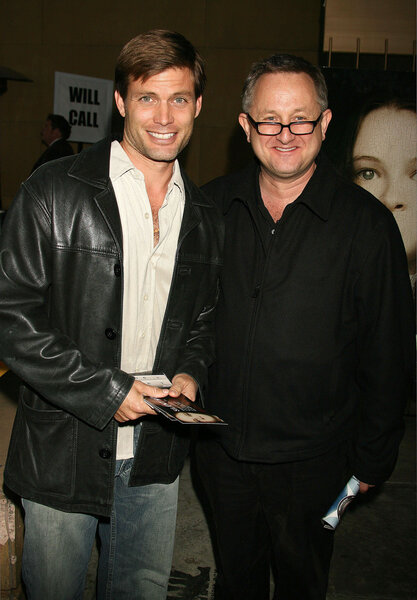Create a free profile to get unlimited access to exclusive videos, sweepstakes, and more!
Screenwriter Ed Neumeier on disguising 'tougher issues' behind genre and RoboCop Returns' future

In the mid-1980s we wanted to live in worlds where we busted ghosts with slacker ex academics, buckled swashes on Indiana Jones' second adventure, and owned a pet mogwai (even promising we wouldn't feed it after midnight). But at the same time, a studio development executive was creating a world we didn't want to live in, of the crumbling inner city abandoned by political leaders as self-serving corporate interests commoditized everything. Even the police force was expendable, leaving a vacuum for those multinationals' other product lines to fill.
RoboCop, when it premiered in 1987, was a nihilistic, violent, self-contradictory hybrid — gleeful, glossy, and aware of all the toy tie-in genre tropes while also serving as an urgent, terrifying prophecy about capitalism gone mad all at once.
Director Paul Verhoeven brought a very European non-squeamishness to the unflinching story (a gang shooting a cop to death and laughing about it? Street thugs threatening to indecently assault a woman? A guy half-melted by toxic sludge splattered into paste by a speeding car? All on the table.) and got a much harder R than most of its '80s contemporaries like Beverly Hills Cop or Scarface.
Featuring politics out of control, money running everything, and corruption everywhere, Robocop screenwriter Ed Neumeier's work has turned out to be more prescient than most. Now the 62-year-old Neumeier is hoping to do it again with a direct sequel to the 1987 original. He spoke to SYFY WIRE about his body of work, including an update on the status of RoboCop Returns.
When did you know you wanted to be in movies?
George Lucas made American Graffiti in Marin County and brothers and sisters of people I knew were in it, so it was suddenly like the movies had come to town. It turned out he lived a couple of blocks away because when a cop who lived in the neighborhood served a traffic ticket warrant there they bought him in to see a bunch of scenes from a movie they were working on, all sci-fi looking, World War II film of fighter planes and stuff.
After Star Wars came out my girlfriend found a phone book listing for "Luke and Leia Skywalker" and the address of Lucas' post-production offices. We showed up and no one was there, so we went in. I don't remember much of what we saw, but the idea this phenomenon began in my hometown was mind-blowing, it made it feel possible you could do something like that.
Is there a throughline that connects all your work?
I take great delight in how people can be depended upon to behave stupidly, the hypocrisy of people. The humor and point of view that comes across [in my scripts] is "this is the idea and this is the way it's corrupted because of good intentions or greed or whatever."
I think that's what people like about RoboCop and Starship Troopers. Paul [Verhoeven] and I saw the world in a similar way and immediately recognized it in each other.
Is the social commentary of your movies as important as action and spectacle or is it just story mechanics?
I hide behind genre so I can say these other things and you accept it because it's silly and funny and bright, it's not asking you to take it too seriously. People like to laugh, and the laughter gives you a distance to take on tougher issues like police, use of force, crime, murder, fascism, and politics at a bit of a distance.
How did RoboCop come together?
[Paul Verhoeven] was sent the script and the story I've heard is he read the title and said, "I'm never going to make a movie called RoboCop," he was a serious filmmaker. His wife read it and told him he might like it and apparently by the time he'd reached the scene where Murphy is shot to pieces by the gang he was already booking his flight to the U.S.
I worked with a lot of bright people like Phil Tippett making everything better. Peter Weller was an amazing talent to pull this off. He took it seriously and it was an absolutely devoted, absolutely fantastic performance.
So many lucky things happened. We were very ambitious for a modest budget [$13 million] and under a lot of pressure. When we finished we came back to LA and it was a whole new problem trying to get an R rating. We were given an X rating. We kept going back [with edits] and they kept rejecting us.
All we know about RoboCop Returns is that it's a sequel to the original. What else can you say?
When I came back I said, "We should do an R-rated movie. It has to be funny and satirical." But we almost live in a satirical world right now so it's harder for people to take satire the way they did 30 years ago.
Neill Blomkamp has come and gone with his writer Justin Rhodes, now you're rewriting with Abe Forsythe, correct?
We had a deal, Neill came on, then Abe Forsythe came on and I think he's using a lot of the stuff Neill had and some of the original stuff [from the 1998 script]. But Abe is doing his own version, which is what I wanted.
I needed a fresh voice and he had a really interesting idea. We're hoping when the next draft comes in we'll be in a position to make it.
What have the discussions with Abe been like?
Abe made a really interesting movie in Little Monsters, but he made a really interesting Australian film about the race riots [Down Under] I was really impressed with, it was kind of a pseudo-documentary and had an '80s style.
I didn't want to say too much, I wanted him to have the ideas and not worry about any other version of it, including ours, and just do his own thing. It was very nice to be able to say that to someone like Abe with confidence. What he came back with was really interesting, it felt relevant and really crackled. I expect to see a script any day now.
Is there a formal greenlight?
No, we're still trying to get a script right. We went on some wild rambles with Mr. Blomkamp, so Abe has his work cut out for him.
Are you okay with primarily being known for RoboCop and Starship Troopers no matter what else you work on?
I'm lucky to have gotten those movies made. I feel guilty I haven't done more but I'm very pleased they're both big. They're miracles to have happened at all the more I look back on it, so I'm pleased with them. I'd be insulting a lot of people if I said anything less.



























